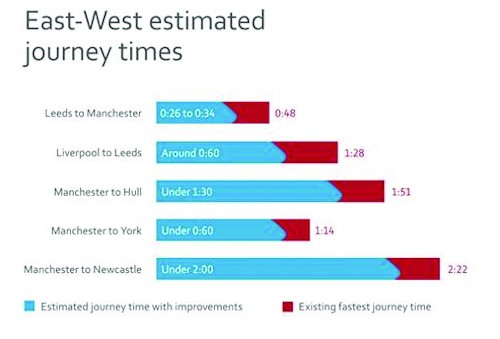The endorsement from prime minister David Cameron and chancellor George Osborne follows the publication of a report by Sir David Higgins, chairman of High Speed Two (HS2), which sees reduced journey times between Leeds and Manchester as one step in an overall strategy toward improving links between Liverpool and Hull.
Sir David’s report also said that journeys between Leeds and Birmingham, Leeds and Sheffield Meadowhall, York and Birmingham, and Nottingham to Birmingham could also be reduced by a half or more, with many more journeys across the country substantially shortened. The report recommends that co-operation on transport issues should be formalised in the north too.

‘Improving connectivity is vital if Britain is to compete in the knowledge economy in which this country has a competitive advantage, but in which ease of travel is an essential element,’ he said in a statement. ‘Knowledge based companies - whether they are in high-tech manufacturing, the creative industries, finance or the law - have to be close, or feel close to the talent, skills base, support network, knowledge pools, collaborators and clients necessary to create the ‘hot-house atmosphere’ in which they thrive. That is why reducing the journey times between and within our cities isn’t just desirable for both passengers and freight. It is a strategic necessity.’
With a high-speed link the journey time between Leeds and Manchester could be cut from around 55 to between 26 and 34 minutes
In response the chancellor announced the creation of Transport for the North. Made up of the main northern city regions, this body is expected to work with other authorities and stakeholders to allow the north to ‘speak with one voice’.
The government, working with Transport for the North, will now produce a comprehensive transport strategy for the region, including options and a delivery timetable for a HS3 east west rail connection. An interim report will be produced in March 2015.
By combining the strengths northern cities, the government believes that the proposals will help transform the economy of the region and play a key role in delivering a Northern Powerhouse, a concept described by the chancellor in June 2104 as ’not one city, but a collection of northern cities – sufficiently close to each other that combined they can take on the world.’
Chief secretary to the Treasury Danny Alexander said: ‘We owe it to taxpayers to make sure the benefits of these projects are maximised and the costs are tightly controlled. Today’s report shows how better transport links will help unleash the north’s tremendous potential for growth which will benefit the whole of the UK.
‘As I said when I launched the National Infrastructure plan, excellent infrastructure is essential if we are to build a stronger economy and fairer society.’
‘This report tackles the perception that HS2 is a project being developed in isolation, and re-positions it as an integral part of a wider transport system which carries the potential to spread growth right across the country – this is a much needed and welcome shift in the debate.’
Nick Baveystock Institution of Civil Engineers (ICE) director general
Sir David’s comments and recommendations are contained in his second report on the future of HS2. Rebalancing Britain: from HS2 towards a national transport strategy - looks at the prospects for improving connectivity across the North of England and the Midlands.
The four main proposals are:
- Need to take forward both legs of the proposed HS2 Y-network – the alternatives will not bring the same capacity, connectivity and economic benefits.
- Improve the rail services between east and west - sharply reducing journey times between Liverpool, Manchester, Leeds, Sheffield and Hull will stimulate local economies. Sir David says the journey from Leeds to Manchester could be cut from today’s average of over 55 minutes to somewhere between 26 and 35 minutes, depending on which option is chosen, and the number of trains could be doubled.
- Northern cities should speak with one voice – local authorities from five key cities should join together to form a new body. Sir David suggests calling the group Transport for the North.
- Set out a timetable to develop a new transport strategy - building on the One North report to decide on an approach for improving rail and road connectivity across and within the region north of Birmingham.
The report from Sir David Higgins also gives strong backing to the case for Phase Two of HS2 and sets out proposals to maximise its benefits. His proposals include bringing forward plans for a hub station at Crewe to 2027 and a fundamental review of the right solution for Leeds station to allow connections between HS2, existing rail services and improved east west connections.
The government will set out its detailed plans for Phase Two in 2015.





Red Bull makes hydrogen fuel cell play with AVL
Surely EVs are the best solution for motor sports and for weight / performance dispense with the battery altogether by introducing paired conductors...